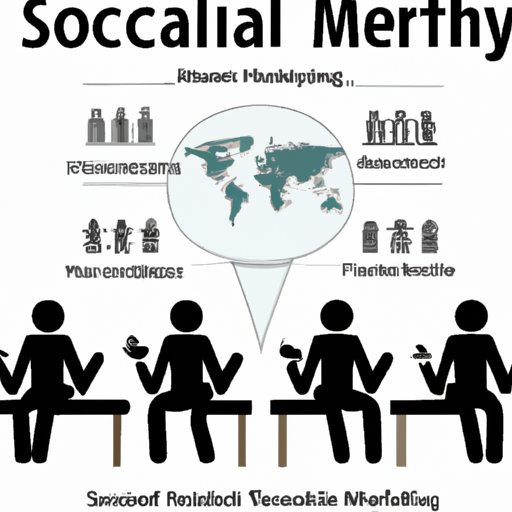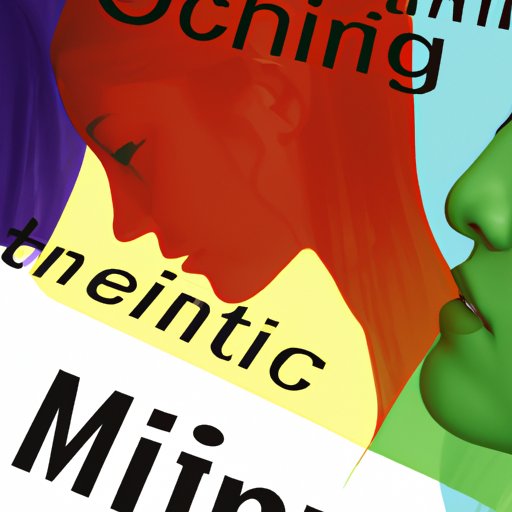Introduction
Mental health is a complex issue that is shaped by a variety of factors, including culture. Culture refers to shared beliefs, values, customs, and behaviors that are passed down from generation to generation within a particular society. Mental health, on the other hand, is an individual’s psychological well-being, which can be affected by cultural influences.
In this article, we will explore how culture influences mental health. We will examine the impact of cultural norms, practices, values, and socialization on psychological well-being. We will also investigate the relationship between culture and mental illness, as well as cultural differences in mental health treatment.

Examining the Impact of Cultural Norms on Mental Health
Cultural norms refer to the accepted standards of behavior within a given society or group. These norms can have a significant impact on mental health, as they shape attitudes towards mental illness and the way it is perceived and discussed.
Exploring Cultural Attitudes Towards Mental Illness
The way a culture views mental illness is often reflective of its values and beliefs. In some cultures, mental illness is seen as something to be ashamed of, while in others it is viewed as a natural part of life. This can affect how people with mental health issues are treated, as well as the resources available to them.
Understanding How Cultural Stigmas Affect Mental Health
Cultural stigmas can also have a negative impact on mental health. People with mental illnesses may face discrimination and prejudice due to their condition, which can lead to feelings of shame and isolation. This can prevent people from seeking help or engaging in activities that could improve their mental health.
Exploring the Role of Cultural Practices in Psychological Well-Being
Cultural practices, such as religion and traditional healing methods, can also have an effect on mental health. These practices can provide people with a sense of purpose and community, as well as a source of comfort and support. They can also help individuals cope with difficult emotions and situations.
Analyzing the Effects of Religion and Spirituality on Mental Health
Religion and spirituality can play an important role in mental health. For many people, faith provides a sense of meaning, purpose, and hope. It can also give people a sense of belonging and community, which can be beneficial for mental health. Additionally, religious practices such as prayer and meditation can help reduce stress, anxiety, and depression.
Examining the Impact of Traditional Healing Practices on Mental Health
Traditional healing practices, such as herbal remedies, massage, and acupuncture, can also have a positive impact on mental health. These practices can help reduce stress and improve mood, as well as provide physical and emotional relief. Additionally, traditional healing practices can help individuals gain a better understanding of their own emotions and needs.
Analyzing the Link Between Cultural Values and Mental Health
Cultural values, such as gender roles and racial and ethnic identity, can also influence mental health. These values can shape the way people think about themselves and the world around them, which can have a significant impact on psychological well-being.
Investigating the Relationship between Gender Roles and Mental Health
Gender roles are often associated with certain expectations and behaviors, which can have an effect on mental health. For example, women are often expected to take on more domestic responsibilities than men, while men are expected to be more competitive and assertive. These expectations can lead to feelings of pressure, guilt, and inadequacy, which can have a negative impact on mental health.
Examining the Impact of Race and Ethnicity on Mental Health
Racial and ethnic identity can also affect mental health. People from minority backgrounds may experience discrimination and racism, which can lead to feelings of helplessness and despair. Additionally, cultural values and traditions can influence the way people view themselves, which can have a significant impact on mental health.

Understanding How Socialization Affects Mental Health
Socialization is the process by which individuals learn the values, beliefs, and behaviors of their culture. It is heavily influenced by family dynamics, as well as by peers and society at large. Socialization can have a major impact on mental health, as it shapes the way people think about themselves and the world around them.
Exploring the Impact of Family Dynamics on Mental Health
Family dynamics can have a significant effect on mental health. Family members can provide comfort and support, which can help individuals cope with difficult emotions and situations. On the other hand, family conflict and dysfunction can lead to feelings of insecurity and anxiety, which can have a negative impact on mental health.
Examining the Influence of Society on Mental Health
Society can also have an impact on mental health. Social pressures, such as the need to fit in or achieve success, can lead to feelings of stress and anxiety. Additionally, societal expectations, such as gender roles, can create feelings of pressure and guilt, which can negatively affect mental health.
Investigating the Relationship Between Culture and Mental Illness
Culture can also influence the development of mental illness. Certain cultural beliefs and practices, such as stigma and shame surrounding mental illness, can contribute to the onset of mental health issues. Additionally, cultural factors, such as gender roles and racial and ethnic identity, can make individuals more vulnerable to developing certain types of mental illness.
Examining Cultural Factors Associated with Mental Illness
Cultural beliefs and practices can have a profound effect on mental health. For example, traditional healing practices, such as herbal remedies and massage, can help reduce stress and improve mood. However, certain cultural beliefs and practices, such as stigma and shame surrounding mental illness, can contribute to the onset of mental health issues.
Investigating How Cultural Beliefs and Practices Can Contribute to Mental Illness
Cultural beliefs and practices can also contribute to the onset of mental illness. For example, certain cultural values, such as gender roles and racial and ethnic identity, can make individuals more vulnerable to developing certain types of mental illness. Additionally, traditional healing practices, such as herbal remedies and massage, can help reduce stress and improve mood, but can also be used in ways that can contribute to mental illness.

Examining Cultural Differences in Mental Health Treatment
Culture can also influence the way mental health issues are treated. Different cultures may have different approaches to mental health treatment, such as traditional healing practices or mainstream medical treatments. Additionally, cultural barriers, such as language, poverty, and stigma, can prevent individuals from accessing the mental health services they need.
Exploring Cultural Barriers to Accessing Mental Health Services
Cultural barriers can prevent individuals from accessing the mental health services they need. Language barriers, poverty, and stigma can all be obstacles to accessing mental health care. Additionally, cultural beliefs and practices, such as traditional healing methods, can influence the type of treatment an individual seeks.
Understanding Different Approaches to Mental Health Treatment Across Cultures
Different cultures may also have different approaches to mental health treatment. For example, some cultures may rely on traditional healing methods, such as herbal remedies and massage, while others may prefer mainstream medical treatments. Additionally, cultural attitudes towards mental illness can determine whether individuals seek treatment or not.
Conclusion
This article has explored how culture influences mental health. We examined the impact of cultural norms, values, practices, and socialization on psychological well-being. We investigated the link between culture and mental illness, as well as cultural differences in mental health treatment. Overall, it is clear that culture plays an important role in mental health, and that understanding cultural influences is essential for improving mental health outcomes.
In order to improve mental health outcomes, it is important to recognize and address cultural barriers to accessing mental health services. Additionally, it is important to be aware of cultural attitudes and beliefs surrounding mental illness, and to ensure that those with mental health issues are treated with respect and compassion. Finally, it is essential to understand different approaches to mental health treatment across cultures, and to ensure that individuals are able to access the treatment they need.
(Note: Is this article not meeting your expectations? Do you have knowledge or insights to share? Unlock new opportunities and expand your reach by joining our authors team. Click Registration to join us and share your expertise with our readers.)
